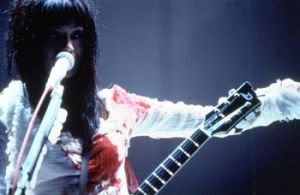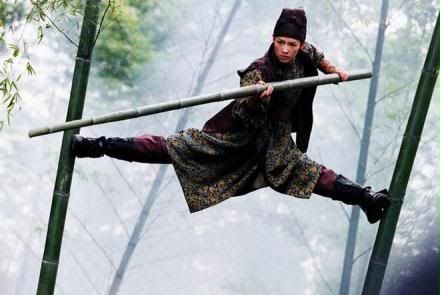Music 2004
Since it's a new year finally I figured it was time to clear off the sidebars. I'll leave the films up for a little while longer, at least until I see a few more movies; mainly
Million Dollar Baby,
House of Flying Daggers, and
Time of the Wolf, and probably a few others. (I have a deep suspicion that
Goodbye Dragon Inn will eventually be my favorite movie of the year, but I haven't seen it yet and probably won't for some time.)
But I can at least write a little about my music choices. I am a complete amateur with music so expect some malapropism, errors in judgment, and just plain ignorance.
I ventured pretty deeply into psychedelic music this year (as I did last year), finding much satisfaction in impossibly dense soundscapes, blistering electric guitar solos, and long form meditative mantras. So it seems pretty obvious that The Neck's
Drive-by and Houston natives Charalambides'
Joy Shapes both deserve to be album of the year for me.
Describing
Drive-by is easily beyond my musical vocabulary, but I'll try. Much like previous albums by this jazz group, it's one long piece, about 63 minutes (and also like their other albums the last ten minutes are a bit of a snore--they seem to feel the same need to wind down as they do to wind up). An absolutely gorgeous series of chords from a piano pop up every now and then, but the real attraction here is the drums and bass, which combine to create what is a truly trance inducing effect, a rhythm that never ceases to be seductively beautiful and addictive. Best part occurs late in the game, where everything drops out but the drums, casting the listener into a primal relationship with the reverberations, movement, space, and even a physical sense of pleasure. Give it time and space.
Joy Shapes, is fittingly 180 degrees away from
Drive-by. There is no rhythm to speak of, just airy (and often spooky) guitar jangling that melts and melds dissonance into some beautiful forms of harmony. The singing will put you off at first, but learn to treat it as an intstrument and it fits perfectly. Seemingly celestial, it offers a great counterpart to the earthy sensuality of The Necks.
Boredoms,
Seadrum/House of Sun: my favorite band returns with what is hopefully just a teaster. The second track (out of two) is a very pretty siter vs. guitar showdown, but the first track is pretty unique. Yoshimi keens beautifully for a few minutes before a percussion rises up like the tide all around her (hence the name of the song I guess). Eventually piano keys rain down on your head so fast it's like sensory overload. Absolutely stunning and beautiful, if exhausting.
Otomo Yoshihide's New Jazz Quintet's
Tail's Out is probably not a major album for free jazz aficionados, but this dilettante loved it. Yoshihide brings a real rock (almost metal!) sensibility to the louder pieces. Check out the drums at the end of the second track and the hilariously obnoxious rendering of Strawberry Fields Forever that never fails to make me laugh. The final two tracks, a beautiful rendering of a jazz classic complete with ear splitting sine-waves that morphs into a form of music the Japanese call
onkyo, which as far as I can tell tries to create shifting sound sensations and colors rather than situating itself around a firm rhythm or melody--it goes for pure sound and it's absolutely hold-your-breath-or-it-will-fly-away gorgeous.
Camera Obscura,
Underachievers Please Try Harder: just plain and pretty pop music in the mould of Belle and Sebastian, but a lot better for my money. The singer can be a little to fey and coy, but she often reaches for beautiful intimacy and gets it.
Finaly, Comets on Fire make it for basically creating one of the greatest rock songs of all time on
Blue Cathedral--an old school hard rock meets pysch album that isn't nearly long enough for me. Great fun.
Puffy AmyYumi,
Hi Hi Puffy AmiYumi Show Soundtrack: Basically a greatest hits compilation. Flawless and exhilarating power pop. I just got their album
Nice from last year and it's perfect as well. Don't deny yourself something this great! (The cartoon ain't bad either!)
Best of the rest:
The Streets,
A Grand Don't Come for Free: Great for it's determined commitment to the mundane.
Bjork,
Medulla: a minor work, for sure. Some gorgeous bits though, and deceivingly complex.
Espers,
Espers: 60s style haunted folk-psych.
Mara Carlyle,
The Lovely: kind of a lovely chamber piece. Fantastic singer.
OOIOO,
Kila Kila Kila: wildly underrated. Probably seems a bit sparse and even empty to some, but for lovers of Yoshimi & Yuka's
Flower with no Color, it's the next logical step. Yoshimi's penchant for interesting sounds over songcraft may annoy some (and she may never top her masterpiece
Green & Gold) but if you have the patience there are a lot of rewards to be found here.
Annie,
Anniemal: fantastic europop. If you don't like this you are dead inside.
Lot's of other great stuff out there, of course. (I just remembered Yuka Honda's great new album, for instance.) Not a great year for music overall, however. I spent much of the year in the 70s myself (Popol Vuh, anyone?). Looking forward to a new Kate Bush album next year, as well as The Avalanches and Daft Punk.








